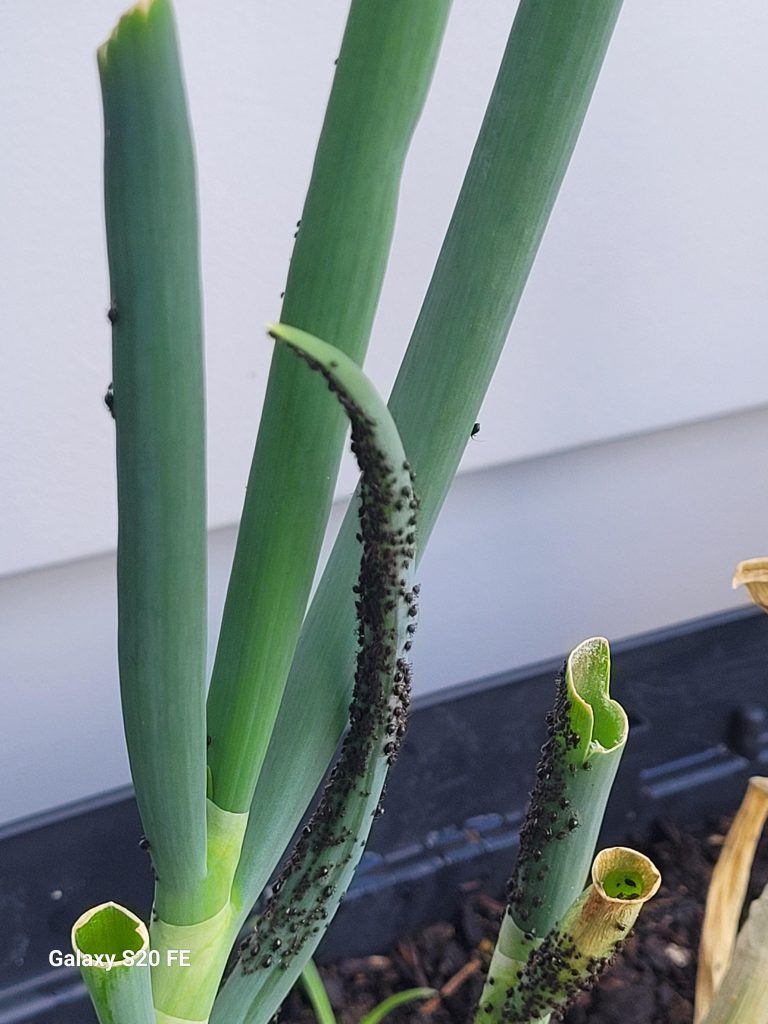Are you in need of in-depth knowledge on onion and garlic production? If yes, we are a call away. Contact us for: Onion seedlings, Garlic seedlings, Germinated garlic cloves, Farm planning services, Soil testing, training on onion and garlic growing, Drip irrigation installation and maintenance, Agronomic support, Onion and Garlic value pack and Farm management. For free consultation, placing orders or booking a visit with an agronomist, please contact us via Call or what’s app +254703982228, Email: Info@oniondoctor.co.ke. You can also check out our social media handles for daily updates on TikTok: https://www.tiktok.com/@oniondoctorke?_t=ZM-8wmsTu0qumO&_r=1 Instagram: https://www.instagram.com/oniondoctorke?igsh=MTVoaHF3aWUydTJzaQ==Facebook:https://www.facebook.com/share/16SwgYn2dG/ Youtube:https://youtube.com/@oniondoctorke?si=u5Jnd-r0qU9UDYqL and Twitter: https://x.com/OnionDoctorKe?t=FR3JXlS_oN1vjjUgAtfyzg&s=09

Pest: Onion Aphids (Neotoxoptera formosana)
Onion aphids are small, pear-shaped insects that pose a significant threat to onion crops. These sap-sucking pests weaken plants by extracting essential nutrients from the leaves, causing them to curl, distort, and turn yellow. Onion aphids also secrete a sticky substance known as honeydew, which attracts ants and promotes the growth of sooty mold, further reducing plant health and yield.
Symptoms of Onion Aphid Infestation
- Wilting and yellowing of onion leaves.
- Stunted plant growth due to nutrient loss.
- Distorted or curled leaves as a result of aphid feeding.
- Presence of sticky honeydew on plant surfaces, which encourages sooty mold formation.
- Visible colonies of onion aphids clustering on leaves and bulbs.
Causes of Onion Aphid Infestation
- Aphids are naturally attracted to Allium species (onions, garlic, leeks, and chives) due to the sulfur compounds responsible for their strong aroma.
- Overcrowded planting and excessive nitrogen fertilization create an ideal environment for rapid aphid population growth.
- Mild temperatures and lack of natural predators allow aphid populations to multiply quickly.
Impact on Onion Crops
- Reduced Onion Yields: Heavy infestations weaken plants, causing them to dry out and collapse, leading to significant yield losses.
- Poor Plant Health: The loss of sap reduces the plant’s ability to photosynthesize, making it more susceptible to diseases.
- Spread of Viral Diseases: Onion aphids can transmit harmful plant viruses, further impacting crop productivity.
- Quality Reduction: The presence of honeydew and sooty mold reduces the marketability of onions.
Prevention Measures for Onion Aphids
1. Crop Rotation: Avoid planting onions or related crops in the same field consecutively to disrupt the aphid life cycle.
2. Sanitation Practices: Regularly remove and destroy plant debris and volunteer Allium species that can serve as breeding grounds for aphids.
3. Companion Planting: Grow aromatic herbs like rosemary, mint, or basil near onions to naturally repel aphids.
4. Balanced Fertilization: Avoid excessive nitrogen, as it encourages excessive vegetative growth, making onions more attractive to aphids.
5. Encourage Natural Predators: Beneficial insects such as ladybugs, lacewings, and parasitic wasps help keep aphid populations in check.
Effective Treatment Methods
Biological Control
- Natural Predators: Introducing lady beetles, lacewings, and parasitic wasps can effectively reduce aphid numbers in the field.
Mechanical Control
- Water Sprays: A strong jet of water can physically remove aphids from onion plants, reducing their population.
Chemical Control
- Insecticidal Soaps: These help to break down the outer protective layer of aphids, leading to their elimination.
- Neem Oil: A natural insecticide that disrupts the growth and reproduction of aphids while being safe for beneficial insects.
- Systemic Insecticides: If infestations are severe, insecticides may be necessary, but they should be used responsibly to prevent harming pollinators and other beneficial organisms.
How Onion Doctor Supports Farmers
At Onion Doctor, we are committed to helping smallholder farmers across Africa combat onion pests and maximize their yields. We provide expert guidance, quality onion seedlings, soil testing, drip irrigation solutions, agronomic support, and integrated pest management strategies. Our goal is to help you grow healthier onions while minimizing losses due to pests like onion aphids.
For expert onion farming support and premium onion seedlings, contact Onion Doctor today!
Thankyou for the insightful content!
I will engage your services very soon .
Welcome, we’re here ready for you!